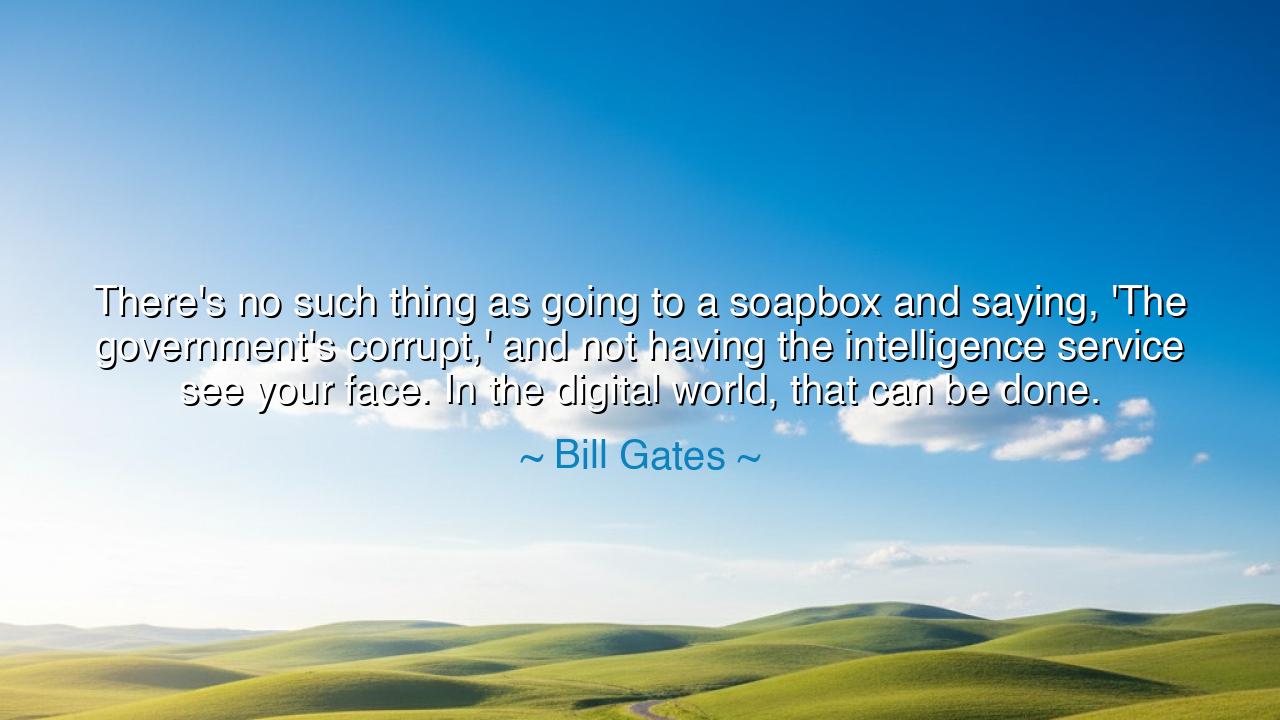
There's no such thing as going to a soapbox and saying, 'The
There's no such thing as going to a soapbox and saying, 'The government's corrupt,' and not having the intelligence service see your face. In the digital world, that can be done.






In the words of Bill Gates, "There's no such thing as going to a soapbox and saying, 'The government's corrupt,' and not having the intelligence service see your face. In the digital world, that can be done," we are faced with a reflection on the evolution of privacy, freedom, and surveillance in the modern age. Gates highlights the paradox of our time: while the digital world offers new platforms for free expression, it simultaneously exposes individuals to the watchful eyes of state surveillance. Gone are the days when one could speak publicly, standing on a soapbox, and make their grievances known without fear of being recorded or monitored. In today's interconnected world, every word, every action, and every interaction can be traced, analyzed, and observed, often without our knowledge. This reality forces us to grapple with questions of freedom versus security, and the limits of personal privacy in an age of ever-increasing technological oversight.
The ancients understood well the tension between freedom and control, though their challenges were more directly tied to physical presence and political authority. Socrates, the great philosopher, spoke truth to power in ancient Athens, challenging the very structures of government and society. His public critiques of the Athenian democracy led to his trial and eventual execution, as his ideas were deemed a threat to the established order. Socrates’ voice was heard because it was public, delivered in the marketplace and within the walls of the city, where all could listen. However, the danger for Socrates lay in the physicality of his dissent—his words could be easily linked to his identity, and his body could be punished. Bill Gates’ insight into the modern digital world reveals that, although the tools of expression have changed, the vulnerability of dissent has only grown, as the digital footprint can easily track an individual’s every movement and statement.
The historical story of Edward Snowden, a former NSA contractor, underscores the power and danger of digital surveillance. In 2013, Snowden exposed the global scale of government surveillance programs, revealing how intelligence agencies were collecting data on millions of people worldwide without their consent. His actions, motivated by a belief in freedom and privacy, demonstrated the stark contrast between the physical world, where individuals could protest publicly, and the digital world, where every communication could be monitored. Like Socrates, who found himself punished for his voice, Snowden’s revelations led to consequences that would haunt him for the rest of his life. In this modern era, however, Snowden’s story shows how the digital footprint can make even the most private acts of rebellion subject to immediate scrutiny and retribution.
The lesson Gates imparts here is not merely one of technology, but of the evolving relationship between individuals and the state. In ancient times, the state was often an external force—one that wielded power through laws, armies, and physical control. The digital age, however, has blurred the lines between public and private, allowing the state—or any powerful entity—to monitor, control, and even manipulate individuals in ways that were once unimaginable. This shift is not just a matter of security or surveillance, but a fundamental change in the balance of power between the individual and the collective. What Gates underscores is that the tools we once used to safeguard freedom—public speeches, protest movements, or even simple dissent—are now vulnerable to the very systems we create to enhance our connectedness.
Consider the example of totalitarian regimes in the 20th century, such as the Soviet Union under Stalin or Nazi Germany under Hitler. These regimes relied on a combination of fear, propaganda, and control to suppress dissent. In those times, the state could monitor and punish public acts of rebellion, but it required physical presence and human resources. In contrast, today’s surveillance systems, powered by technology, allow for far-reaching control that transcends physical borders. The very tools that connect people and empower them to communicate now also enable states to monitor, track, and analyze their every action in ways the ancients could scarcely have imagined. In the digital world, as Gates points out, the very soapbox that once served as a symbol of freedom and protest has now become something that can be watched, traced, and controlled.
The true lesson of Gates’ words lies in the recognition of this new reality: freedom and privacy are no longer guaranteed by physical distance or location but by the decisions we make in the digital space. While the digital age brings with it unprecedented opportunities for expression, it also carries profound responsibilities for maintaining our privacy and safety. As we continue to engage with the world through technology, we must be aware of the potential surveillance that comes with it. We must find ways to ensure that our voices are not drowned out or controlled by the very systems that were meant to connect us.
In our own lives, we must learn to navigate the digital world with wisdom, caution, and awareness. The tools of expression and communication are now in our hands, but they come with an inherent vulnerability that the ancients could not have foreseen. Just as Socrates knew the power of speaking truth to power, but also understood the risks that came with it, we must be mindful of the cost of speaking out in a world where digital footprints are permanent. Let us strive for freedom, but let us also be wise in understanding the forces at play in the digital age, and how we can use technology to safeguard our privacy, without relinquishing the truths we seek to express.






AAdministratorAdministrator
Welcome, honored guests. Please leave a comment, we will respond soon